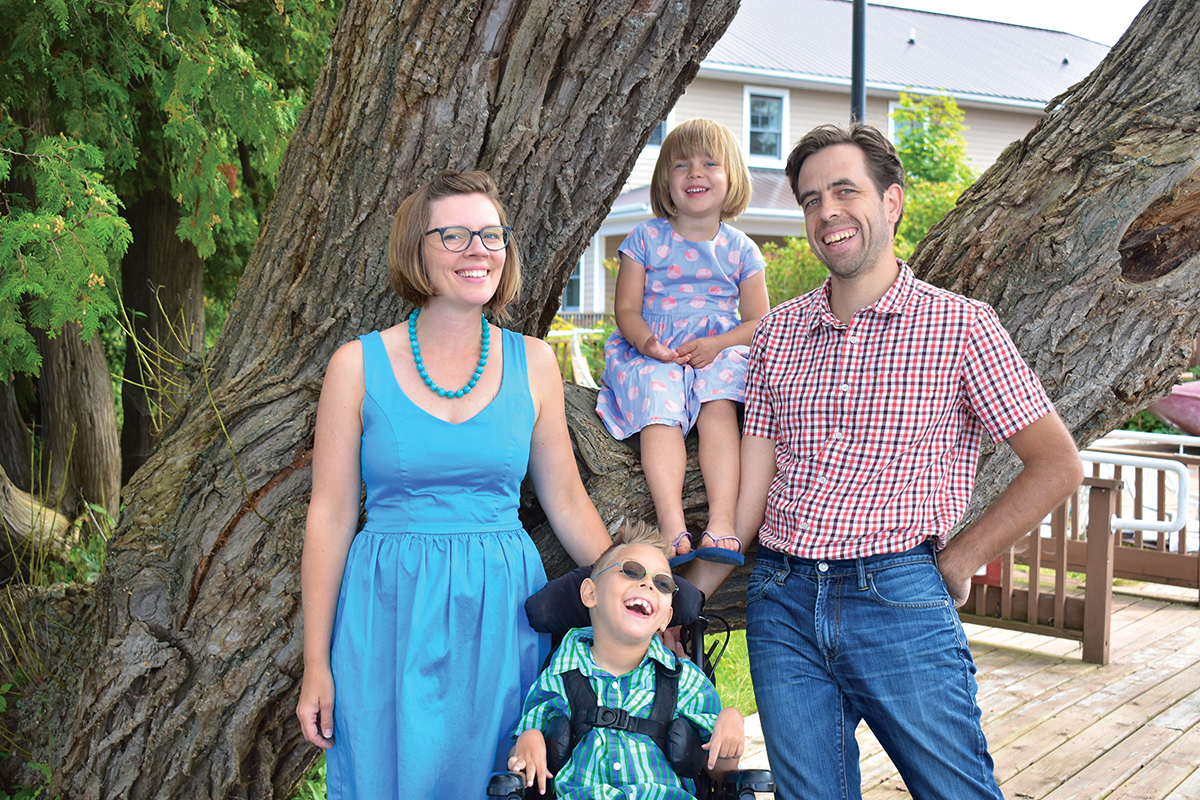Kara Melissa Sharp and her husband, Alastair, haven’t had the luxury of living in the moment. After tucking their two children into bed, they couldn’t relax on the couch with a glass of wine. They were too busy researching, emailing, talking and sometimes dissolving into tears as they tried to find out what, if anything, they could do to stay in Canada, the country they’ve called home for the past seven years.
The globe-trotting couple arrived here in 2010 on a work visa for Alastair, who is a journalist. Initially, the move was just the next step in their adventures. Alastair was born in Australia and Kara in the United States; they met on an island in Malaysia and had their son, Sebastian, who has cerebral palsy, in the United Kingdom in 2008. They were living in Egypt when Alastair was offered a job in Toronto.
You may unsubscribe from any of our newsletters at any time.
“Having lived internationally for several years, we were used to living in cities that boiled over with diversity,” Kara says, remembering their decision to relocate. “We wanted to find a diverse place to live.” They fell in love with Toronto, making friends and forming a new community.
After having their daughter, Tallula, in 2012, they decided to officially put down roots and started the long application process for permanent residency. What didn’t cross their minds was that this country might not want them.
That realization arrived in the form of what Immigration, Refugees and Citizenship Canada calls a “procedural fairness letter.” The Sharps learned that their entire family could be denied permanent residency on health grounds. Basically, the government believed that because of his disability, Sebastian could require more health and social service costs than the average Canadian, a situation called “excessive demand.”
“It was like a punch to the gut,” says Kara. “We deal with discrimination almost on a daily basis; anyone who has a disability, or who has a friend or family member with a disability, knows what it’s like to go about your regular daily routines and find obstacles. You get used to it. But when you get a letter that says, . . . ‘We’re going to tell you all the things wrong with [your son] and why that’s not good enough for us,’ it’s dehumanizing. It feels just awful.”
By circumstance, the Sharps have joined a chorus of voices, including politicians, lawyers and advocates, who would like to change the excessive demand clause in the Immigration Act because they feel it discriminates against people with disabilities. The government is finally listening: a parliamentary committee is reviewing the law, and the immigration minister has stated he is committed to making changes. Many would prefer if he threw out excessive demand all together — rather than children with disabilities and their families who want to weave themselves into the fabric of Canada.
The Immigration and Refugee Protection Act lists a host of reasons why someone can be denied a visa (a time-limited permit to visit, work or study here) or permanent residency (the ability to live in the country for as long as the person wants). They are mostly criminal in nature, such as being charged with human rights violations, terrorism or espionage. But tucked among the no-nos are “health grounds.” Canada can refuse applicants who have a medical condition that is “likely to endanger public health or public safety” or “cause excessive demands on health or social services.” While the former is more about contagious diseases, the latter often applies to those with disabilities.
“[Excessive demand] essentially excludes people with disabilities from any chance of immigrating here,” says Allen Mankewich, a Winnipeg-based disability advocate. “We don’t explicitly ban people with disabilities. But we dress up disability with cost calculations.”
Officials have set a dollar figure to determine what qualifies as excessive demand. As of Jan. 1, 2017, the government established $6,655 as the amount the average Canadian uses in health or social services each year. This “cost threshold” is calculated using data from the Canadian Institute for Health Information with additional estimates for social services such as personal support care and special education. Any foreign national who has a health condition that may require services that cost more than the threshold could be denied entry or ordered to leave the country.
According to the office of Ahmed Hussen, minister of Immigration, Refugees and Citizenship, this provision “intends to protect health and social services that are paid for by the public, including those that have significant wait-lists for Canadians, while promoting refugee protection and supporting family reunification.” This statement alludes to the fact that UN Convention refugees are exempt, as are spouses and dependent children sponsored by a Canadian citizen or permanent resident.
That means Sebastian’s disability wouldn’t be a consideration if either Kara or Alastair were already a citizen. But that isn’t the case, and neither are they refugees. That left the couple with another possible way around the provision: prove they can pay for any of nine-year-old Sebastian’s health or social service needs beyond the threshold. The government lacks systems for people like the Sharps to make those payments, however, so immigration officials suggested Kara and Alastair enrol Sebastian in private school and pay out-of-province fees for his medical needs, just like people without an Ontario health card. While the Sharps pay taxes, they were willing to relinquish their son’s right to use the services they contribute toward.
“Sebastian’s disability was caused by negligence at his birth,” explains Kara, “so we are in an ongoing case with the National Health Services in the U.K. The hospital admitted their fault in his birth, so we will be granted the cost of care for him.”
To settle their legal case, they need permanent residency so the cost of Sebastian’s care can be determined (health-care costs vary widely from country to country). But without a settlement finalized, Kara worried they might not have enough to prove to Canada that they can pay for the services Sebastian needs. Caught in this nightmarish catch-22, Kara and Alastair tried to remain optimistic while they waited to hear the government’s decision. “You’ve got to have some hope,” says Kara. “But those moments when hope passes are devastating.”
Minister Hussen’s office can’t comment on specific cases, but a spokesperson did say that “no specific health condition will result in an automatic refusal of an application.” The office said that an “estimated figure” of 0.2 percent of applicants are denied each year on the grounds of excessive demand. In October, CBC News reported that 337 applicants were denied in 2016, down from 473 the year before.
In an investigation published last summer, Global News reporters Andrew Russell and Brian Hill raised questions over the accuracy of the cost threshold, suggesting that Immigration Canada does not account for all social services spending by the provinces. Russell and Hill estimate the limit should be at least $7,404.
James Hicks is the national co-ordinator for the Council of Canadians with Disabilities (CCD), and he wasn’t surprised by Global’s findings. CCD has been lobbying the government to change the excessive demand clause for 26 years. The United Nations Convention on the Rights of Persons with Disabilities, which Canada signed on to in 2010, clearly states that “parties shall recognize the rights of persons with disabilities to liberty of movement, to freedom to choose their residence and to a nationality, on an equal basis with others.” Hicks believes excessive demand and its cost threshold get in the way of that freedom.
“I don’t know anybody who causes the medical system to pay out less than 6,000 and some odd dollars,” Hicks says from his home in Ottawa. “It’s an amount so low that almost anybody would spend that much, [so technically] nobody should be able to immigrate. It really is a clause that has no bearing in reality but is being used to deny a certain group of people. . . . Personally, I think it’s one of the most discriminatory things the government does.”
Hicks is also concerned about the message the policy sends here at home. “If you’re denying people because they’re going to cost too much to assist them, you’re telling them that they’re not going to have any worth here,” he says. “So Canadians with disabilities get the same message. . . . You’re not contributing, you’re a burden to the health-care system, you’re a burden on the social services system. It’s a horrible message to send.”

That’s exactly how Jon Warkentin and his wife, Karissa, felt in November 2016 when they received a fairness letter because of their daughter’s disability. The Warkentins and their five kids had moved from Colorado to Waterhen, Man., in 2013 to fulfil a dream of owning and running a hunting and fishing lodge.
They arrived on a work visa because getting permanent residency can be a long process. “When you’re starting a business and you have a real estate transaction that’s taking place, nobody’s going to wait two years for you to purchase their property,” says Jon. “Our plan was always to apply for permanent residency once we got here. We just didn’t anticipate that we were going to have any problems.”
A year after they arrived, their youngest daughter, Karalynn, who was two at the time, had a seizure. Doctors diagnosed her with epilepsy. Later, her parents noticed she was slightly developmentally delayed, which her physicians think may have been the result of epilepsy.
Karalynn is now six and functions at about the level of a four-year-old. She hasn’t had another seizure, nor is she on any medication. She just requires a specialized education plan at school. “She spends a lot of time with the educational assistant in her classroom,” says Jon. “But the assistant isn’t just there for Karalynn. She’s there for other students as well, and it’s a very small school. There are only nine students in her kindergarten class.”
When the Warkentins went for the standard immigration medical exam, they brought all of Karalynn’s health information. Jon says the doctor told them he didn’t think they had anything to worry about. So they were shocked when the letter arrived a year and a half later, informing them that their permanent residency application was in question because Karalynn’s education needs may be an excessive burden.
In response, the couple put together a package, including letters from Karalynn’s principal and school division treasurer, explaining that the little girl doesn’t require any more services than other children her age and that, if she ever did, the family would pay for it. Jon thought it was just a formality and was confident everything would be fine. But it wasn’t. A letter of denial arrived last April, clearly stating the decision was final and even suggesting Karalynn might not be able to visit the country in the future. The letter said they had until November, which is when their visa was set to expire, to pack up and leave.
The Warkentins hired a lawyer to file a federal appeal, essentially taking the government to court. After some media attention this past summer, they received a glimmer of good news: immigration had reopened their file to review their case. They hope this means they are getting a second chance.
“I understand the cost, and I understand what they’re trying to do and trying to protect the taxpayers of Canada,” says Jon. “We certainly aren’t coming here to take advantage of anybody. I’m not trying to come here and pull one over on the government and get some special deal. We just wanted to make a life here.”
Along with the Warkentins’ case, the government is currently assessing excessive demand in its entirety. Minister Hussen’s office has been meeting with provincial and territorial governments, since any alterations to the policy will impact health and social services budgets, which fall under their jurisdictions.
In November, Hussen spoke before the parliamentary committee conducting the review. “From a principled perspective, the current excessive demand provision policy simply does not align with our country’s values of inclusion of persons with disabilities in Canadian society.” He said all options are being considered, including getting rid of the provision entirely, but he was vague about what the change might look like. A date has not been given for when the review will be complete, but a spokesperson said this is expected to happen “in the near future.”
Lawyer Toni Schweitzer is not confident the current review will bring about real change. She is representing Mercedes Benitez, who arrived from the Philippines nine years ago and works as a live-in caregiver for an elderly man in the Toronto area. Benitez had to leave her husband and two sons behind. In the hope of reuniting with her loved ones, she applied for permanent residency for herself and her family back in 2010, only to learn that they might be denied because her 18-year-old son has an intellectual disability.
Schweitzer worries the government is still approaching the provision from a dollar and cents perspective. “They need to rethink how they look at this, because our law is saying, ‘You disabled person, you are nothing but a liability to Canada, so we’re going to look at how much of a liability you are.’ It is completely and utterly failing to acknowledge that there are contributions to our society that disabled people can make in all kinds of ways,” says Schweitzer. “I suppose the most blatant would be to look at somebody like [theoretical physicist] Stephen Hawking, who would [likely] be medically inadmissible to Canada.”
Last summer, Kara and Alastair Sharp predicted the government’s review wouldn’t be complete before their visa expired on Oct. 21. With time ticking, the possibility of having to move started to loom. They’d largely been able to hide the situation from Sebastian and Tallula, even asking doctors not to bring it up in front of the kids. But if their application was denied, they’d have to broach the subject.
“If in fact we do have to leave, of course we’ll talk about it,” Kara said in July. “We’ll talk about why and what’s wrong with it. We’ll talk about the discrimination of the government, but we will not talk about it being because of Sebastian’s disabilities, because that’s not the reason. The reason is because the law discriminates against Sebastian and other kids and adults like him.”
Thankfully, that conversation didn’t happen. The family’s confirmation of permanent residency arrived in the mail in early October, four and a half years after starting the process and just a week before their visa expired. The letter informing them of the good news didn’t include any details on whether or not they’ll have to pay for services or if Sebastian can stay at his public school. Whatever the requirements, the family is just relieved to know Canada is now officially home. “I feel like I can dream again,” says Kara. “I feel like there’s possibility — and we have a choice in what that looks like.”
Editor’s note: In early December, the Canadian government approved the Warkentin family’s application for permanent residency.
This story first appeared in the December 2017 issue of The UC Observer with the title “Inaccessible.”














